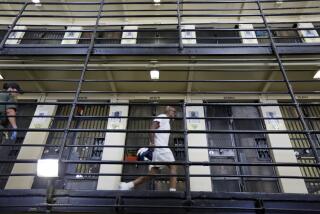Death row inmate’s claim seems headed for rejection
- Share via
SAN FRANCISCO — The California Supreme Court appeared ready Wednesday to reject an innocence claim from a death row inmate, despite evidence that a key witness in the murder case may have been telling the truth when he said the defendant was not guilty.
During arguments, three of the seven justices who spoke indicated that they would follow the conclusion of a trial judge, known as a “referee,” who was appointed by the court to hear inmate Dennis Lawley’s claims of innocence.
“Based on the evidence, the referee concluded that your client has not proven his actual innocence,” Justice Kathryn Mickle Werdegar told defense lawyer Scott Kauffman.
Kauffman, quoting from Stanislaus County Superior Court Judge John E. Griffin Jr.’s report, called it “more impressionistic than factual” and argued that the evidence he presented showed Lawley had not taken part in the 1989 murder of Kenneth Stewart.
Lawley was convicted in the contract killing of Stewart. The prosecution argued that the defendant hired Brian Seabourn, an ex-con, to kill Stewart, because he had robbed and beaten Lawley at his Modesto cabin.
Seabourn, who was tried separately, denied involvement but was convicted of second-degree murder. Seabourn later said that he killed Stewart at the behest of the Aryan Brotherhood, a violent prison gang, and not on Lawley’s behalf. He also said he had used a .357-caliber Smith and Wesson in the crime and had buried it in a Modesto field.
Prosecutors, however, presented evidence that a gun of a different make found in Lawley’s cabin was the murder weapon.
Three weeks ago, a search of the field where Seabourn said he buried the murder weapon uncovered a rusty, corroded .357-caliber Smith and Wesson. The court has refused to weigh the discovery in the current appeal but has said Lawley may file a separate petition to have it considered.
On Wednesday, Justice Joyce L. Kennard pointedly asked Kauffman if the court should disregard trial evidence about Lawley’s motive for revenge and threats to kill Stewart.
Kauffman replied that the prosecution had withheld evidence in the trial that pointed to Aryan Brotherhood involvement. A letter from a key gang leader at Folsom prison was found in Seabourn’s car but was never turned over to the defense.
“The words ‘Aryan Brotherhood’ were not heard in Dennis Lawley’s case,” Kauffman said.
Deputy Atty. Gen. David Eldridge argued that the defense witnesses “had nothing to lose by lying on the stand” to aid Lawley. Eldridge also said that Seabourn had offered to shape his story for Lawley’s advantage.
Lawley, 64, a delusional paranoid schizophrenic, represented himself at trial.
He contended that he was framed for the murder because he aspired to “go down in history” as the “Beast of [the Book of] Revelations.”
Justice Carol A. Corrigan noted that the law permitted Lawley to represent himself. “Does Mr. Lawley have the right to present whatever defense he wants?” Corrigan asked.
Kauffman replied that a capital defendant should not be permitted to present a “preposterous defense.” Corrigan, however, said the law allows just that.
The court will decide the case within 90 days.
--
More to Read
Sign up for Essential California
The most important California stories and recommendations in your inbox every morning.
You may occasionally receive promotional content from the Los Angeles Times.













